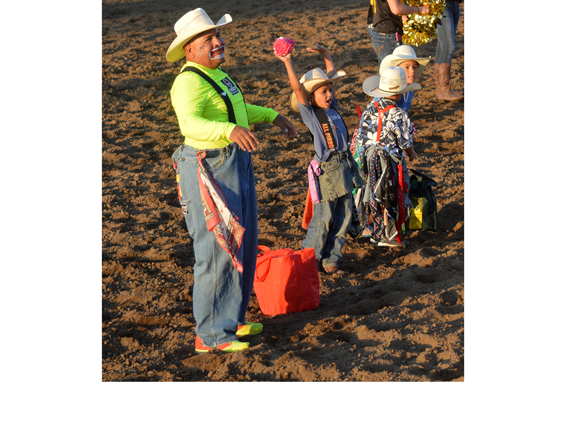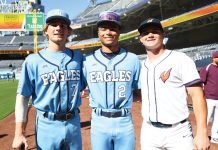Rodeo is important to our history. It all started with this ranch versus this ranch. As it moved along, riders were needed to help riders when they got bucked off. That is when the rodeo clowns came into the games. Then it grew bigger and bigger. This is the legacy that Danny Alvarez, "Buffalo Chip" in the arena, has lived and passed on in his more than 30 years as a rodeo clown bull fighter.
Rodeo is important to our history. It all started with this ranch versus this ranch. As it moved along, riders were needed to help riders when they got bucked off. That is when the rodeo clowns came into the games. Then it grew bigger and bigger. This is the legacy that Danny Alvarez, "Buffalo Chip" in the arena, has lived and passed on in his more than 30 years as a rodeo clown bull fighter. Lakeside born and raised, and then raising his own, Alvarez's love of his family, friends, rodeo and his community is what keeps him in the arena, even after "retiring," well, quite a few times. It is the people in the rodeo community and his hometown that keeps this rodeo clown entertaining, regardless of injuries, broken bones, surgeries and age.
Turning 67 this week, Alvarez said it is the life-long relationships that he has made throughout his career that keeps him in the arena. Witnessing much of rodeo history, it is the people of the rodeo that are at the core of the man behind the makeup.
"If you notice, that group of people had morals, they were honest and they would help out anybody that was in need. They would drop what they were doing and help. I see that to this day," he said. "The El Capitan Stadium Association is all run by volunteers, and there are hundreds of them. So that shows you what kinds of people go to rodeos."
These are the principles of life that kept Alvarez in the coaching of his children, several little league teams, El Capitan's varsity football and basketball teams, all of them loves of his life. And he said it is strongly built in the ethics he learned in the rodeo arena, beginning as a bull rider in his early 20s.
"I love the smell of the rodeo," he said. "People think I'm crazy. It's a bunch of road apples and cow patties. But I love it. When I walk in, I get that feeling again. Even though I don't fight bulls anymore, or very rarely am in the barrel, I still get butterflies. It's just slightly before kickoff. If ever I lose that feeling then I'll know it's time to quit. But now, when I get into the arena, I feel no pain. It's like a miracle medicine. Of course the next morning…"
Alvarez's humor is superseded only by his dedication to the spirit and sport of the rodeo. He said even though he started as a bull rider, he wasn't very good at and got hurt a lot. He stopped the game until years later his friend Rodie Cox, a bull rider turned bull fighter asked him to help out at a rodeo. He thought it was a one-time gig, but Cox called him again the next weekend. It was that particular rodeo that Alvarez said he knew, without any doubts, he wanted to be a rodeo clown.
"A mom and dad came up to me after the rodeo and they asked if their daughter could see what I looked like," he said. "I noticed that she was blind as she came closer. With her mom's help she got her hand and felt my grease paint, my suspenders, my baggies, my hankies, hat and wig and she got the biggest smile on her face. She just lit up. I thought then that if I could make any child laugh that has problems, if I can make them forget them for just a little while, that's what I want to do. After that is was almost every weekend for a long time."
Alvarez was out with the bulls every time. He said he was fortunate and that Cox was a big influence as he was Bullfighter of the Year the second year they worked together. So for many years, he fought off the bulls.
"That's how I got all of these injuries. Broke my back, broke my neck, knees, ankle…," he said. But retirement was not in sight for very long before that smell of the arena called him back. "It was after my knee surgery, I was feeling better and then I got a phone call from Don Hickle asking if I wanted to help out at the rodeo. I told him I retired and he wouldn't take no for an answer. He told me I can't retire, its tradition and its Lakeside. So that's when I started doing the opening act and helping with the stick horses. And that was…?"
Now, still not retired, Alvarez works the El Capitan Stadium Association's Lakeside Rodeo, the Lakeside Optimist Bulls Only Rodeo and also the Valley Center Rodeo for the past two years. "But I'm smart enough to get back and let the youngsters fight the bulls. I'm out there with my dummy so my dummy gets hit, not me. I have a dummy named Lucky," he said. "These days I look back and they look so young. Then I realize that I have gone through decades of bull fighters. It's amazing how fast life goes when you look back and see what you were, but now in them. I call them kids, but their young men, (still kids though)."
His love of working with children does not stop in the rodeo arena. Making the kids laugh and helping them discover what the spirit and sport of rodeo is about is his top priority. During the week before the rodeo, Alvarez is out in the local schools with the rodeo queens, the Lakeside royalty and the Chamber of Commerce teaching and encouraging the sport to the next generation.
"I'm a Lakeside guy, so when they ask me to do something I do it," he said. "We hit every school around, some in Alpine, go in, do some acts promoting the rodeo and I love doing this still. I'm going to do Valley Centers' this year. Even if I don't do its rodeo, they've asked me to go to the schools with their rodeo queens."
As busy as Alvarez stays these days, it is still the tight knit rodeo family and the many lessons in life that he learned from many of them on the way that drives him to continue to make people smile and pass on a little bit of his love for the rodeo.
One was a friend of his, Little Bull Rider. His friends called him Little Mike. He came back from the Gulf and had PTSD. The rodeo was the only thing that made him feel better. "He came to me one day and said, 'This is what got me better,'" he said. "It's like the military, it's the same as in battle. It's a life and death situation here and the same thing there. He associated the two together and it helped him with his troubles. Everybody supported him. It has the same camaraderie, like a brotherhood. Even in the competition it's not a me versus you. They all work together because it is you versus the animal. That's what I like about it too. I've never seen any kind of bad sports. It's always 'a great ride,' even if the guy just beat them. Inside they might not be that happy that they were beat, but outside they stick together."
Alvarez said along with the camaraderie he still loves the look on people's faces when he makes them laugh, children that are afraid of clowns when they get to the rodeo, but unafraid by the time they leave, and watching the next generation of bull fighters, including his youngest son Wyatt who has followed in his father's footsteps, many times performing side by side. And with Buffalo Chip, aka Danny, the life-long relationships are still happening and the smell of the arena still draws him to the crowd, the rodeo and the people that live it.














